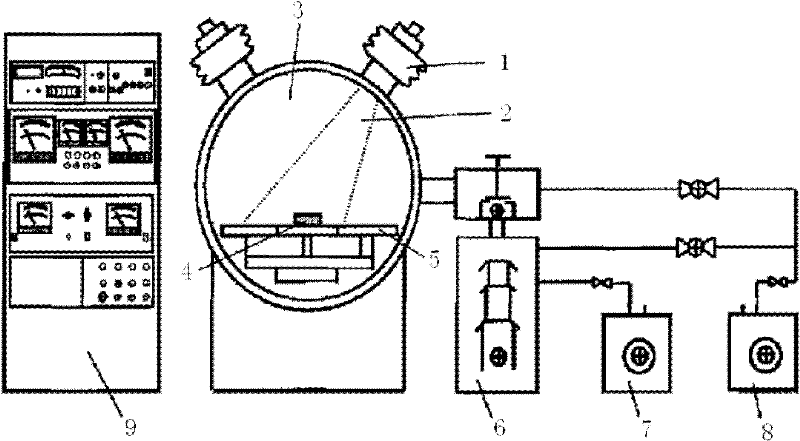Method for predicting radiation attenuation of electrons and protons of spatial solar cell
A technology of solar cells and proton irradiation, applied in the field of satellite solar cells, can solve the problems of high cost, large manpower and material resources, etc.
Active Publication Date: 2012-02-01
中电科蓝天科技股份有限公司
View PDF4 Cites 6 Cited by
- Summary
- Abstract
- Description
- Claims
- Application Information
AI Technical Summary
Problems solved by technology
Due to the wide range of spatial energy spectrum, the model needs to do 9 typical energy spectrum irradiation experiments in order to ensure the accuracy. Once the battery technology changes, all experiments need to be redone, so this method consumes a lot of manpower, material resources and costs. very high
Method used
the structure of the environmentally friendly knitted fabric provided by the present invention; figure 2 Flow chart of the yarn wrapping machine for environmentally friendly knitted fabrics and storage devices; image 3 Is the parameter map of the yarn covering machine
View moreImage
Smart Image Click on the blue labels to locate them in the text.
Smart ImageViewing Examples
Examples
Experimental program
Comparison scheme
Effect test
Embodiment 1
[0053] A method for predicting the decay of electrons and protons in space solar cells, using the displacement damage method to predict the decay of electrons and protons in space solar cells, the experimental conditions, process and process steps:
the structure of the environmentally friendly knitted fabric provided by the present invention; figure 2 Flow chart of the yarn wrapping machine for environmentally friendly knitted fabrics and storage devices; image 3 Is the parameter map of the yarn covering machine
Login to View More PUM
 Login to View More
Login to View More Abstract
The invention relates to a method for predicting radiation attenuation of electrons and protons of a spatial solar cell and belongs to the technical field of satellite solar cells. A displacement injury method used for predicting comprises the following steps of: (1) determining a relationship between displacement injury and radiation attenuation performance of the electrons and the protons of the solar cell, and testing energy levels of the electrons and the protons; (2) computing the displacement injury of the cell by using non-ionization energy loss to obtain a relationship between the displacement injury and electrical performance attenuation of the cell; (3) computing total displacement injury of the electrons by using a calculus electronic energy spectrum and computing displacement injury of the protons by using a calculus protonic energy spectrum; (4) determining an attenuation ratio of an electrical performance parameter, and multiplying the initial value of the electrical performance parameter by the attenuation ratio to obtain a predicted value of the electrical performance after radiation; and (5) substituting the electrical performance parameter into the a formula to work out relevant data, and then working out the parameter of the cell after the radiation at any working point according to the formula. The method has the advantages that the method is easy to operate, high-efficiency, quick and low in cost, data is accurate, and the like.
Description
technical field [0001] The invention belongs to the technical field of satellite solar cells, in particular to a method for predicting the radiation decay of space solar cells and protons. Background technique [0002] As the main energy source of satellites, space solar cells will experience performance degradation due to the radiation of space protons and electrons during space flight. In order to ensure sufficient power supply during satellite flight in orbit, it is necessary to predict in the design stage of satellite solar cell arrays Irradiation degradation of space solar cells. [0003] At present, the radiation attenuation prediction method adopts the equivalent dose method. This method does not need to be clear about the radiation decay mechanism of the battery, and the principle is simple, but this method requires 9 energy levels and 45 fluences of radiation experiments, which require 270 space solar cells (6 pieces per energy level) and will consume a lot of ener...
Claims
the structure of the environmentally friendly knitted fabric provided by the present invention; figure 2 Flow chart of the yarn wrapping machine for environmentally friendly knitted fabrics and storage devices; image 3 Is the parameter map of the yarn covering machine
Login to View More Application Information
Patent Timeline
 Login to View More
Login to View More IPC IPC(8): G01R31/265
Inventor 程保义呼文韬张岩松
Owner 中电科蓝天科技股份有限公司
Features
- R&D
- Intellectual Property
- Life Sciences
- Materials
- Tech Scout
Why Patsnap Eureka
- Unparalleled Data Quality
- Higher Quality Content
- 60% Fewer Hallucinations
Social media
Patsnap Eureka Blog
Learn More Browse by: Latest US Patents, China's latest patents, Technical Efficacy Thesaurus, Application Domain, Technology Topic, Popular Technical Reports.
© 2025 PatSnap. All rights reserved.Legal|Privacy policy|Modern Slavery Act Transparency Statement|Sitemap|About US| Contact US: help@patsnap.com



